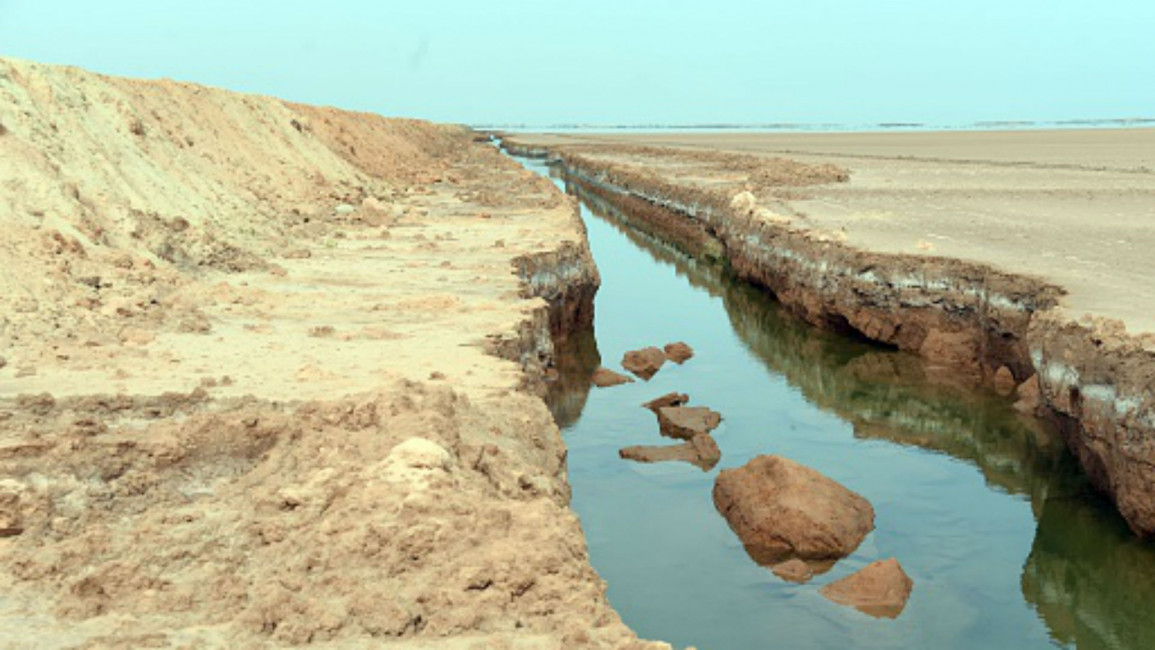Tunisia builds anti-terror barrier along Libya border
Tunisia builds anti-terror barrier along Libya border
Tunisians officials inspected the first part of a huge anti-terror wall on the country's eastern border, designed to lock out militants from neighbouring war-torn Libya.
2 min read
The barrier runs along the Libyan border includes berms and trenches [Getty]
Tunisian defence minister visited on Saturday the first anti-terrorist barrier built on the country's frontier with Libya as part of anti-terror measures announced by the Prime Minister Habib Essid last summer.
The fence initiative came following two terrorist attacks that killed 59 foreign travellers and severly impacted on the North African state's crucial tourisn industry.
The barrier is part of a planned 122 mile [196 kilometre] fence it is hoped will stem the flow of militants and weapons from Libya into Tunisia.
Defence Minister Earhat Horchani inspected the wall, which is set of have electronic monitoring systems installed.
"Today we finished closing it off, and this will help us protect our border and stop the threat," he said.
Military personal and journalists were given a tour of the structure, which is made up of sand running alongside water-filled trenches.
Horchani announced that the project came about with financial funding from Germany and the US.
The US-led a Global Coalition to Counter ISIL conference last week in Rome, where the 23-member states reassessed measures to prevent IS from expanding.
US Secretary of State John Kerry warned that if the militant group gains a stronghold in Libya it will have access to billions of dollars in oil revenue.
Over 3,000 Tunisians have left their homeland to join IS and other militant groups in Syria and Iraq but many have returned to North Africa to join IS in Libya.
In the past few years, Tunisia has witnessed several terrorist attacks that had harmed its tourism industry, the lifeline of the North African country's economy.
The fence initiative came following two terrorist attacks that killed 59 foreign travellers and severly impacted on the North African state's crucial tourisn industry.
The barrier is part of a planned 122 mile [196 kilometre] fence it is hoped will stem the flow of militants and weapons from Libya into Tunisia.
Defence Minister Earhat Horchani inspected the wall, which is set of have electronic monitoring systems installed.
"Today we finished closing it off, and this will help us protect our border and stop the threat," he said.
Military personal and journalists were given a tour of the structure, which is made up of sand running alongside water-filled trenches.
Horchani announced that the project came about with financial funding from Germany and the US.
The US-led a Global Coalition to Counter ISIL conference last week in Rome, where the 23-member states reassessed measures to prevent IS from expanding.
US Secretary of State John Kerry warned that if the militant group gains a stronghold in Libya it will have access to billions of dollars in oil revenue.
Over 3,000 Tunisians have left their homeland to join IS and other militant groups in Syria and Iraq but many have returned to North Africa to join IS in Libya.
In the past few years, Tunisia has witnessed several terrorist attacks that had harmed its tourism industry, the lifeline of the North African country's economy.
Several hotels have also closed down after 38 tourists were killed when gunmen opened fire at them at a beach in the resort city of Sousse.


![President Pezeshkian has denounced Israel's attacks on Lebanon [Getty]](/sites/default/files/styles/image_684x385/public/2173482924.jpeg?h=a5f2f23a&itok=q3evVtko)



 Follow the Middle East's top stories in English at The New Arab on Google News
Follow the Middle East's top stories in English at The New Arab on Google News


